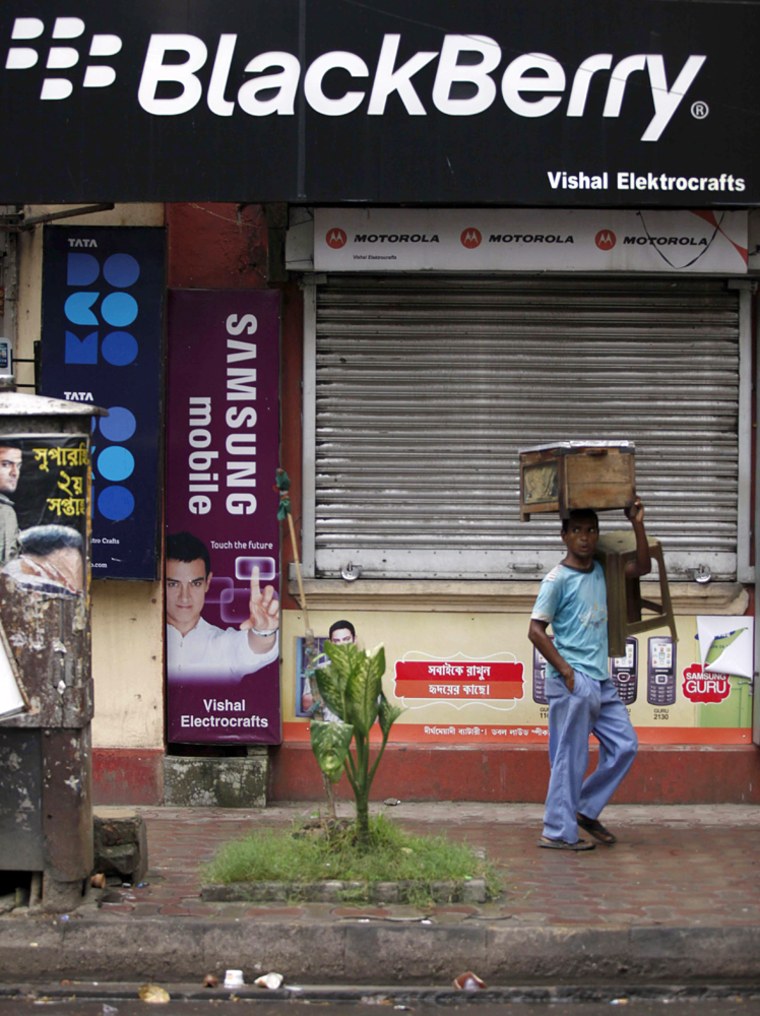Indian demands are giving a new headache to BlackBerry maker Research in Motion after New Delhi threatened a shutdown that could affect one million of the smartphone's 41 million users.
The country's government is also considering widening its crackdown on Internet-based messaging services by shutting down Google and Skype's messaging services, according to government documents seen by the Financial Times.
Indian officials discussed the issue with telecoms and Internet operator associations at a July 12 meeting, the newspaper reported.
The country's Home Ministry threatened to block BlackBerry corporate e-mail and messaging services unless the device's manufacturer makes them accessible to its security agencies by Aug. 31.
The ministry said that if no technical solution is provided by then, it will take steps to block the services from the country's mobile phone network. If a shutdown takes effect, BlackBerry users in India would only be able to use the devices for phone calls and Internet browsing.
Saudi Arabia and the United Arab Emirates have also threatened to cut off popular BlackBerry services unless they get greater access to user information. Like India, they've cited security concerns in pushing for access to encrypted information sent by the cell phones that gets routed through servers overseas.
Security fears
India has asked for encrypted BlackBerry communications to be made easily available to its intelligence and law enforcement agencies, saying that the services could be used by militant groups.
The 10 heavily armed gunmen who rampaged through Mumbai, India's financial capital, in November 2008, killing 166 people, used cell and satellite phones to communicate with their Pakistan-based handlers, according to Indian officials.
In its response to India's announcement, Canada's Research In Motion said on Thursday that it has drawn "a firm line" in negotiations with governments. It won't compromise on the secure nature of its corporate e-mail and messaging service and it won't give any country "special deals." Encryption, it said, is a fundamental technology required in any country that wants to attract and maintain international business.
India noted that it already has access to calls and text messages to and from BlackBerry phones, and to the consumer e-mail service. The threatened shutdown applies to RIM's corporate services.
Canada's international trade minister, Peter Van Loan, said the government has been "working with government officials in India to help RIM identify their concerns and find solutions."
India's announcement came after a meeting involving India's home secretary, an official in charge of domestic security, and representatives of security agencies and the government's telecommunications department, the ministry said in a statement.
"If they cannot provide a solution, we'll ask operators to stop that specific service. The service can be resumed when they give us the solution," said the Indian official, who asked not to be named.
Widening crackdown?
India's ongoing security fears could prompt it to widen its crackdown on Internet-based messaging services, according to a story on the Financial Times website.
"There was consensus that there more than one type of service for which solutions are to be explored. Some of them are BlackBerry, Skype, Google etc," according to minutes from a July 12 meeting between the Indian government and operator associations. "It was decided first to undertake the issue of BlackBerry and then the other services."
Representatives from two operator associations at the meeting confirmed the account to the newspaper, the FT reported.
The Indian demands follow a painful deal with Saudi Arabia, where a source said RIM has agreed to give authorities codes for BlackBerry Messenger users. The United Arab Emirates, Lebanon and Algeria are also seeking access.
"By and large BlackBerry will hope for a solution... given India's potential. They wouldn't want to lose traction at a time when competition worldwide is stiff," said Kamlesh Bhatia, an analyst at technology research firm Gartner.
India seeks access to both email and Messenger, while Saudi Arabia has only targeted the instant messaging service.
The United Arab Emirates last week called for a sweeping ban on BlackBerry e-mail, messaging and Web services, saying the devices "allow users to act without any legal accountability, causing judicial, social and national security concerns." It plans to shut off the services in October unless it works out a compromise with RIM.
Talks between the UAE and RIM are still ongoing, said a person familiar with the issue who spoke to The Associated Press on condition of anonymity.
The person said the UAE is pressing the company to install a data server inside the Gulf federation. That move is motivated by a desire to ensure that information sent on the devices remains protected, not to stifle the flow of information as some critics have charged, according to the person.
"This has nothing to do with freedom of speech," the AP quoted the person as saying. "It's not an issue of access to e-mails. It's an issue of protection of information."
It was unclear if installing a server alone would address all the UAE's concerns. The Emirates also remains concerned that BlackBerry Messenger could be misused by terrorists, the person said.
